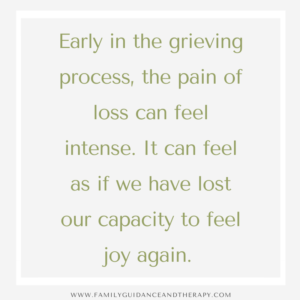If these words describe how you are feeling, we want you to know that there is no textbook timetable for bereavement and that we all experience grief differently. Be gentle with yourself.
Bereavement is a Unique Process
The many emotions that we feel when we grieve, and the length of time that we feel them, are associated with the type of losses that we experience (i.e., death of family or friend, divorce, loss of a job or home, etc.), and how many stresses that we have in our life that can add to the grief.
We can feel a mixture of denial, disbelief, confusion, shock, sadness, yearning, anger, humiliation, despair, and guilt, and none of these feelings can succinctly indicate where we are in our bereavement journey.
Early in the grieving process, the pain of loss can feel intense. It can feel as if we have lost our capacity to feel joy again.
This fresh stage of grief can last for weeks, months, and a year or more. Eventually, we do start coming out of this acute stage of grief. We begin to have hope once again. Our feelings of despair or sadness are triggered less frequently. Rather than feeling grief for long periods of time, we might feel it for just a day or minutes.
Working through the Grieving Process
There are things that we can do to help ourselves (and others) work through the bereavement process.
Reach out to family and friends.
Talk about how you are feeling. Join support groups with people who are undergoing similar losses.
As we grieve our losses, we typically do not want unsolicited advice, we do not want to be ‘fixed,’ we simply need a listening ear. Do not hesitate to express your wishes…this can be incredibly powerful in your healing process.
Accept your feelings of grief.
Give yourself grace. Allowing ourselves to feel the emotions that come with grieving is key to healing. To heal, we must allow the grief to work through us so that we can process it and let it move its way through us…and leave.
According to the U.S. NIH Library of Medicine, studies and history support the theory that we must allow ourselves to feel grief to fully heal from loss, “Avoidance is a natural and adaptive response during grieving in small doses; however, high levels of deliberate avoidance of grief-related emotions may lead to prolonged activation of the suppressed thoughts and physiological arousal, poorer concentration and functioning on tasks in the moment, and prolonged likelihood of recurrent intrusive thoughts in the future.”
Be patient with yourself.
It may take days, weeks, months, or years to process the loss. When you are patient with yourself, you are not resisting the natural progression that leads to healing.
Try to avoid self-directed questions, such as, when is this going to be over, or when am I going to feel like myself again? Develop a mindset that you do not need a timeline. You are healing, and that is what matters.
Engage in self-care.
Self-care includes the basics, such as eating properly and getting enough sleep, but during bereavement, add in some extra healing measures. Find therapeutic ways to release your grief through creative sources such as hobbies, music, or journaling.
Celebrate the lives of others that you love.
Shift your attention away from your loss to someone in your life today. As we celebrate the lives of others, we create a multitude of healing effects.
“If you want to lift yourself up, lift up someone else.” – Booker T Washington
Postpone major life changes.
The length and intensity of your grieving process are very much defined by the stresses in your life.
The top stressors in life include the death of a loved one, marital change, moving to a new home, illness or injury, and loss/change in jobs. We cannot always avoid these stressful events, but when we can postpone any of these during bereavement, we avoid adding extra weight to our healing process.
Seeking Help is a Sign of Strength
Bereavement is our natural response to loss. Sometimes, when we are in the heart of feeling the loss, we do not know how to heal.
Asking for help is a sign of strength and not weakness. It is a sign that you want to manage your grief process and take care of yourself. It is a step forward in the right direction!
We want to help! Make an appointment today.

